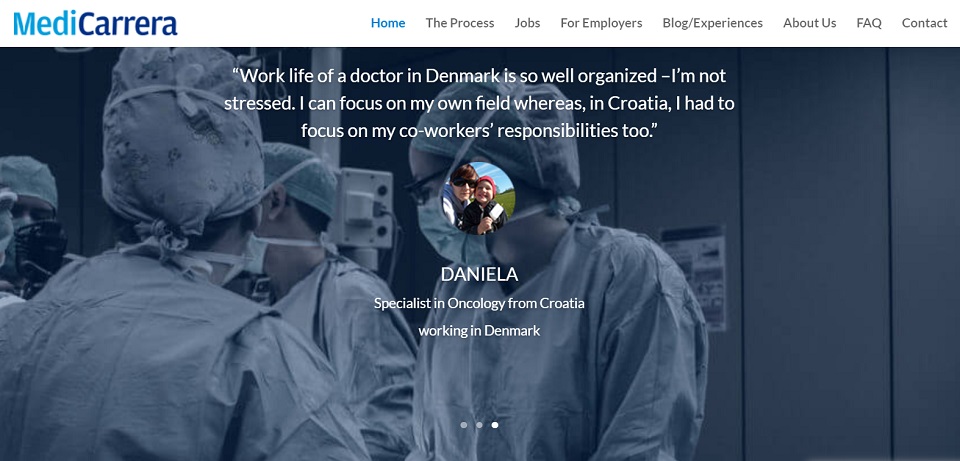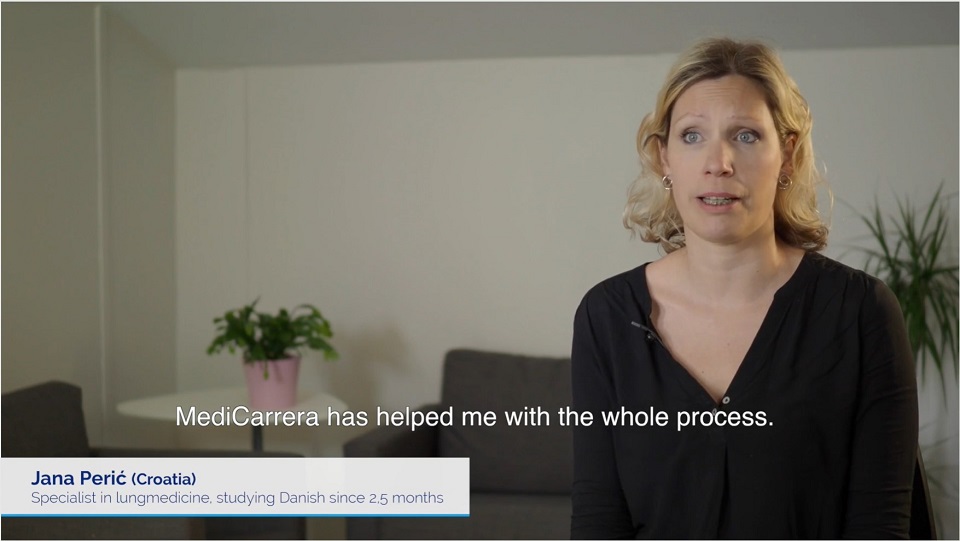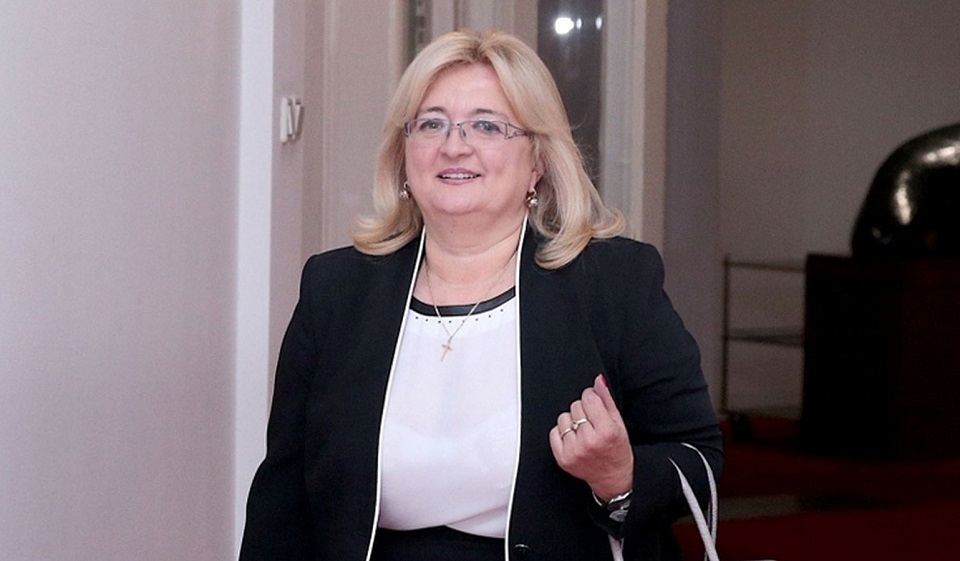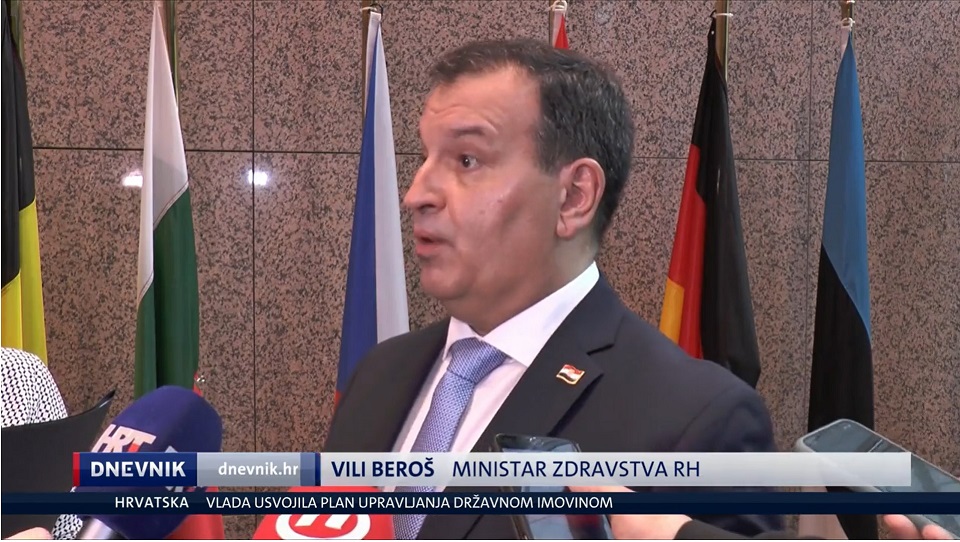Croatians Twice as Likely to Die From Treatable Diseases Compared to EU
Croatian Parliament MPs Božo Petrov and Ines Strenja emphasized that, despite the dismissal of Health Minister Milan Kujundžic, problems with Croatian health system have not gone away. They also pointed out that Croatians are twice as likely to die of treatable diseases as citizens in more developed European countries.

MediCarrera | Screenshot
Medical Staff Leaving Croatia: Remainers Working Unpaid Overtime
"After three and a half years of inaction, it is time to start treating chronic illnesses in the Croatian healthcare system. The system is in debt, irrationally organized, filled with red tape and waiting lists while doctors and other medical staff are leaving Croatia (for opportunities abroad). Those who remain, like nurses, are at a disadvantage and are being forced to work unpaid overtime hours,” Petrov pointed out.
Scandinavia Offers Croatians Free Relocation, Language Training, Child Care
Indeed, more financially prosperous EU countries have set up one-stop recruiting sites to lure medical professionals to their countries to the further detriment of Croatian citizens and residents. MediCarrera, a website serving the medical career recruitment needs of Denmark, Sweden and Norway; offers job placement, language training for hires and their families, accommodations and relocation costs; all of which are financed by employers in their respective countries.

MediCarrera | Screenshot
Several Swedish media outlets have recently criticized Croatia for its demographic losses and emigration.
Despite these external and internal challenges, Petrov insisted to members of the Croatian government that Most would not let them continue policies of inaction which had defined the former health minister's term according to Index on February 14, 2020.
Croatians Have Highest Mortality Rate for Treatable Diseases
Strenja pointed out that Croatian citizens continue to occupy high, and sometimes the highest, mortality rates among all EU citizens for avoidable and treatable diseases.
The reason, she said, lies in the lack of effective preventive medicine, timely diagnosis and the timely beginning of treatment.

Ines Strenja | Most
Strenja: Investing in Preventative Medicine Yields Fourfold Savings
"Again, unrefined protocol, procedures, measures and responsibilities will continue to miss desired expectations, which is ultimately evident in the overall health data. We emphasize that the investment in preventive medicine is the best bet and yields fourfold savings in treatment," Strenje explained.
She added that ex-Minister Kujundžic's files contain proposals for national strategies that would lower the death rate in Croatia from preventable diseases which is currently 293 per 100 thousand inhabitants compared to 140 per 100 thousand in the EU. The mortality from treatable diseases in our country is 140 per 100 thousand compared to only 90 out of 100 thousand in the EU.
“Therefore, I am calling on the new Health Minister, Vili Beroš, to discharge them and move on to combat chronic non-communicable diseases and conditions in Croatia,” Strenja urged.

Ivan Bekavac | N1
Bekavac: Action Plan Another 'Wish List'
Ivan Bekavac, Advisor for Most’s Health Council, pointed out that two key documents should guide the future of Croatians: The Draft Proposal for the Prevention and Control of Chronic Non-Communicable Diseases 2020-2026 and the Draft National Cancer Plan 2020-2030.
"The Action Plan for the Prevention and Control off Chronic Noncommunicable Diseases 2020-2026 does not sufficiently emphasize the responsibility of the Croatian government for the health of the population, because it must place much greater emphasis on the coordination of all departments in promoting and preserving health. It is just a wish list of suggestions, and is almost identical to the previous action plan, and again lacks elements of supervision, monitoring, performance evaluation and research," he explained.
He also considers it a disadvantage that the Draft National Cancer Plan 2020-2030 omitted family medicine doctors who are most familiar with their patients, their habits and family heritage, and emphasized that they should be key stakeholders in encouraging and mobilizing patients for preventive examinations.
Follow our Politics page to keep updated on the health care crisis in Croatia.
Coronavirus Shuts Down Chinese Factory Supplying Croatia Peljesac Bridge
The Pelješki most (Pelješac Bridge) might be the first victim of the coronavirus in Croatia. The Chinese factory which is building the steel structures for the bridge is temporarily closing. Fortunately, the virus has not yet reached Croatia.

Coronavirus Closes Chinese Steel Structure Factory
The virus has paralyzed China, and that now includes the factory where steel structures are being made for the Pelješki most, according to Vibor Vlainić/Dnevnik on February 13, 2020. This does not mean that work on the bridge will cease in Croatia, but the question remains what will happen when the time comes to install these new structures.
Will the steel structures arrive in Croatia on time? Hrvatske autoceste (Croatian Roads) indicated that the contractor has not asked for an extension. The bridge is scheduled to open on July 31, 2021.
"The contractor (China Road and Bridge Corporation) has taken all the necessary measures, first and foremost, to prevent a potential (coronavirus) health threat to the construction site. They have implemented protective measures at the site and these measures are being enacted according to clear guidelines," HAC reported.
However, Hrvatske autoceste will not be able to send supervisory engineers to the factory in China due to the rapid spread of the infection in that country.

EU Heath Ministers Meeting: Croatia Will Not Close Borders
Due to the danger of the virus, a meeting of health ministers of all EU member states was held in Brussels at the invitation of the Croatian Presidency.
Although several countries have imposed entry restrictions on passengers who have been in China; Croatia has not yet followed suit. Two Chinese tourists have reported to Croatian hospitals with upper respiratory infections this past month: one in Pula and one in Split. Both tested negative for the coronavirus.
"We are not claiming to be absolutely certain (in our approach) but are taking caution. Everyone is asking about closing the Croatian borders, but that is not presently a realistic option. If the situation escalates; of course, we will consider additional factors. That is the most constructive approach for this situation, because emergency situations require extraordinary measures," explained Health Minister Vili Beroš.
At the meeting, several countries requested that each passenger coming from a country with confirmed coronavirus cases list each person with whom they have been in contact upon their entry to the European Union. But they eventually arrived at a compromise.
"It is certain that any person would be able to list all the contacts they have had, but it is expected that someone would answer whether they have had contact with people who have showed signs of illness, cough or fever or have been ill," Beroš added.
Daily updates on the coronavirus can be found here. An archive of Total Croatia News articles on the coronavirus can be accessed here.
New Health Minister Beroš Supported by 81 MPs
ZAGREB, January 31, 2020 - The 151-seat Croatian parliament on Friday voted for the appointment of Vili Beroš as the new health minister, with 81 votes in favour, 42 against and one abstention.
Upon the voting, the newly appointed minister took oath.
In January 2018 Beroš was appointed an assistant to then Health Minister Milan Kujundžić, who was dismissed a few days ago.
Before taking office, Beros was the head of the Endocranial and Pediatric Surgery Department of Zagreb's Sisters of Charity Hospital, where he started working in 1998.
Since 2012 he has been an associate professor at the Zagreb University Faculty of Education and Rehabilitation Sciences. He is also a vice-president of the Croatian Society for Cerebrovascular and Endovascular Neurosurgery.
After Prime Minister Andrej Plenković said this past Tuesday that he would propose that parliament confirms his nomination of Beroš as the new health minister, Beroš said that he would do his best to advance the health system and would immediately start talks on unpaid overtime with associations representing medical personnel.
More news about Health Ministry can be found in the Politics section.
Future Health Minister to Change Data in His Declaration of Assets
ZAGREB, January 29, 2020 - Assistant Health Minister Vili Beroš, nominated by Prime Minister Andrej Plenković to succeed the just-dismissed Minister Milan Kujundžić, said on Wednesday morning that later in the day he would enter some changes in his Declaration of Assets, which happened in the last two years.
Beroš told the N1 commercial broadcaster that those changes had happened since he became the assistant minister, explaining that he had refinanced two loans taken in 2008 and 2016 and was now paying them at a more favourable interest rate arranged by the Croatian Medical Chamber for its members.
In 2016, he and his wife borrowed 50,000 euro from Erste Bank and in 2008 they took a loan of 75,550 in euro Addiko Bank.
Beroš also explained that since he became assistant minister, he reduced his activities as a court expert in neurosurgery and some other additional jobs, which had impacted his annual income.
Beroš will therefore meet the Commission's chairwoman, Nataša Novaković, to add those changes to his Declaration of Assets.
The current declaration shows that Beroš and his wife own a property appraised at 1.5 million kuna in the Zagreb suburb of Rudeš, as well as a 50-square-metre flat in the suburb of Vrapče.
He also reports that he has inherited a part of a property in Jelsa on the island of Hvar.
He and his wife possess two cars, one appraised at 75,000 kuna and the other at 120,000 kuna, and he is a co-owner of a speedboat.
The declaration of assets shows that Beroš and his wife, who works in a kindergarten, have managed to save 25,000 euro.
According to Beroš's CV, he was born in Split in 1964, is a university professor and has been employed at the department of neurosurgery of the University Hospital Centre "Sestre Milosrdnice" in Zagreb.
He is a member of the European Association of Neurosurgical Societies Center of Excellence for Neurosurgical Training.
In 1989, he graduated from the University of Zagreb Medical School summa cum laude.
Beroš, a member of the ruling Croatian Democratic Union (HDZ), is the Vice President and founder of the Croatian Society for Cerebrovascular Neurosurgery.
More news about the Ministry of Health can be found in the Politics section.

